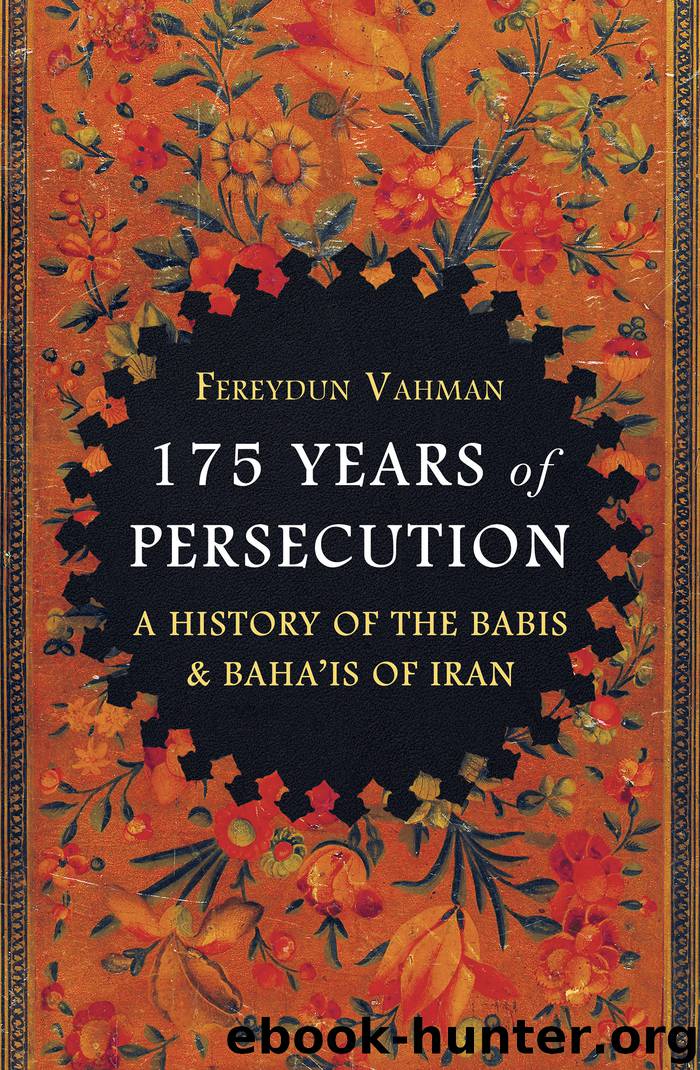175 Years of Persecution by Fereydun Vahman;

Author:Fereydun Vahman; [Vaman, Fereydun]
Language: eng
Format: epub
ISBN: 9781786075871
Publisher: Perseus Books, LLC
Chapter 10
The Baha’is—the First Victims of Oppression in the Islamic Republic
With the shah having left Iran in a chaotic state, Prime Minister Bakhtiar invited Ayatollah Khomeini to return from exile. Bakhtiar envisioned a coalition government with the Ayatollah playing an advisory role from Qom—the Shi‘i equivalent of the Vatican. But the fervor of the welcome from several million Iranians who greeted Ayatollah Khomeini on his arrival in Tehran on February 1, 1979, put the country on another course. Within days, Khomeini had denounced Bakhtiar for his links to the shah and established the basis of an Islamic government, appointing Mehdi Bazargan as interim prime minister.
In its first months, the vast majority of Iranians hailed the revolution’s triumph as the fulfillment of a long-awaited hope for a government based on social justice. Even during Bakhtiar’s brief transition, political prisoners had been freed, press censorship lifted, and the shah’s secret police disbanded. Iran’s Baha’i community viewed the rapid stream of events with a mixture of fear and hope. Many, especially the young, were caught up in the prevailing optimism, believing that conditions would improve following the revolution, and that religious tolerance and democracy would unite all the peoples of Iran under a common banner. Ayatollah Khomeini did not rush into giving his government a religious hue, even asking some of the clergy appointed to high posts to dress in ordinary attire. Although his anti-Baha’i sentiments and the accusations in his earlier writings and sermons linking Baha’is with Zionist espionage were well-known, the new transparency promised by the breakdown of old institutions led many Baha’is to believe that once the revolutionary authorities gained access to the previous regime’s documents they would see that past accusations against the Baha’is had been groundless. Likewise, although Prime Minister Bazargan was known to his students at the School of Engineering for his anti-Baha’i sentiments, many Baha’is were hopeful that with his new responsibility to the nation as a whole, reason would prevail. The elders of the Baha’i community had experience enough to be distrustful, however, and did not hide their misgivings. Events during the transition and beyond would confirm their fears.
An interview that Khomeini granted to Professor James Cockcroft of Rutgers University prior to his return to Iran from Paris foretold the loss of the Baha’is’ meager rights as Iranian citizens. In reply to the question whether the Islamic government would grant religious and political freedom to the Baha’is, Khomeini stated, “They are a political faction; they are harmful. They will not be accepted,” and further denied they would be allowed to practice their religion.1 This brief statement laid out in essence what would become the Islamic regime’s policy towards the Baha’is. Soon after Khomeini’s return to Iran, the Islamic Republic’s spokesman in the United States reassured American Jews that religious minorities would retain full political, cultural, and religious rights in Iran. However, he emphasized that Baha’is would not receive the same rights as they were a political group and not religious.2 Likewise, Prime Minister Bazargan, in
Download
This site does not store any files on its server. We only index and link to content provided by other sites. Please contact the content providers to delete copyright contents if any and email us, we'll remove relevant links or contents immediately.
| Baha'i | Cults |
| Demonology & Satanism | Eckankar |
| Egyptian Book of the Dead | Freemasonry |
| Messianic Judaism | Mysticism |
| Scientology | Theism |
| Tribal & Ethnic | Unitarian Universalism |
The Four Agreements by Don Miguel Ruiz(5511)
Breaking Free by Rachel Jeffs(3623)
The Hatha Yoga Pradipika (Translated) by Svatmarama(2484)
120 Days of Sodom by Marquis de Sade(2439)
Member of the Family by Dianne Lake(2019)
The Tao of Physics by Fritjof Capra(1850)
The Psychedelic Gospels: The Secret History of Hallucinogens in Christianity by Jerry B. Brown(1826)
The Road to Jonestown by Jeff Guinn(1743)
Uriel's Machine by Christopher Knight(1622)
Going Clear by Lawrence Wright(1571)
Going Clear: Scientology, Hollywood, and the Prison of Belief by Lawrence Wright(1570)
The Grand Grimoire: The Red Dragon by Author Unknown(1416)
The Gnostic Gospel of St. Thomas by Tau Malachi(1413)
Key to the Sacred Pattern: The Untold Story of Rennes-le-Chateau by Henry Lincoln(1351)
The Malloreon: Book 02 - King of the Murgos by David Eddings(1309)
Waco by David Thibodeau & Leon Whiteson & Aviva Layton(1294)
The New World Order Book by Nick Redfern(1255)
The Secret of the Temple by John Michael Greer(1217)
The Initiatory Path in Fairy Tales by Bernard Roger(1177)
